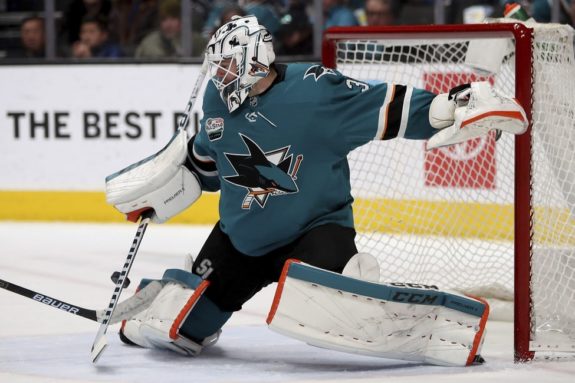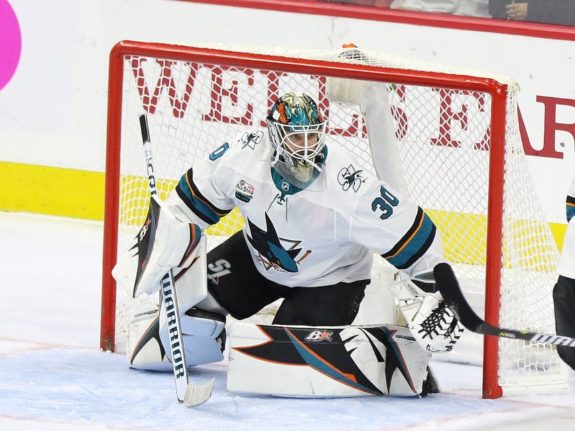San Jose Sharks’ goaltender Martin Jones was recently named the NHL’s third star of the week, following a 3-0-0 week and a .935 save percentage (SV%) over that span.
Unfortunately for the Sharks, Jones could not continue his recent success. He was pulled in consecutive starts against the Washington Capitals and Tampa Bay Lightning, allowed a combined nine goals on only 44 shots, and lasted only 40 minutes in each game. Poised for a rebound performance, Jones once again faltered Sunday afternoon, allowing four goals against the Florida Panthers, increasing the Sharks’ losing streak to four games in the process.
Jones Holds NHL’s Worst Even-Strength Save Percentage
While Jones’ struggles are in the spotlight following this recent stretch, his play has been heavily criticized for some time. From the beginning of the 2018-19 season to the time of writing, he has posted an .889 SV% at even strength. Filtering for goalies with at least 1,200 minutes of even-strength ice time over this period, he ranks 59th out of 59th. Not only is his even-strength save percentage the worst of any starting goaltender in the NHL, it’s the worst of any goaltender, period. By goals-against average (GAA), Jones doesn’t fare much better, ranking 50th out of 59th with a 3.06 GAA over this time period.

While Jones has been known to show up in the playoffs – most notably with a remarkable 1.75 GAA and a .935 SV% during the 2016-17 postseason – the issue is the Sharks may not get the chance to see “Playoff Jones” in action if the status quo continues. The Sharks, currently sixth in the Pacific Division, have allowed 111 goals up until this point – only the NHL’s last-place Detroit Red Wings have allowed more. Simply put, unless the Sharks can reduce their goals against, the playoffs will likely be out of reach.
Jones’ Struggles Partially a Product of Bad Defense
With how bad Jones’ stats look, it may be surprising that another goalie hasn’t surpassed him for the starting role. The issue is backup Aaron Dell hasn’t performed any better. Dell’s .896 even-strength save percentage since the beginning of the 2018-19 season ranks 58th of 59th – only Jones has performed worse.

With the Sharks having the worst goalie tandem in the NHL, it begs the question: is the Sharks’ system simply too difficult on goalies? The Sharks, even when having success, haven’t been known to be defensively responsible. The team has allowed the 11th-most shots on goal so far this season – not great, but not terrible. However, more notably, the team has allowed the third-most scoring chances and the third-most high-danger scoring chances against. A disproportionate share of the shots that Sharks’ goaltenders face are scoring chances, which will negatively influence a goalie’s save percentage.
While the Sharks’ system certainly isn’t easy on goalies, it still doesn’t completely excuse Jones’ performance. Jones’ expected goals against (which factors in his difficult shot quality) per 60 minutes of even-strength ice time is 2.49 – a full goal per game below his actual performance of 3.49. Only Jimmy Howard of the Red Wings has a worse differential in this category. While the blame partially falls on the Sharks’ defensive system, many goalies are better at stopping high-danger shots. Jones ranks last in high-danger goals allowed this season. While he has faced the most high-danger chances in the league, Jordan Binnington of the St. Louis Blues has only faced 14 fewer – and allowed 14 fewer high-danger goals against (25 to Jones’ 39). Jones’ .824 SV% against high-danger chances is simply not good enough.
If the Sharks want to continue their postseason streak, a change may need to be in order. Acquiring a legitimate starting goaltender can be one of the most difficult tasks for a general manager, and the Sharks will need to pursue teams that have strong backup options. Possible trade options could include Tristan Jarry (Pittsburgh Penguins) or Anders Nillson (Ottawa Senators).
However, with the Sharks holding few of their upcoming draft picks, and their own goalies having limited value, they will likely have to give up a roster player if they are committed to acquiring a replacement.